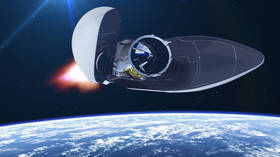ESA satellite forced into ‘first ever’ emergency maneuver to avoid crash with SpaceX constellation

For the first time ever, the European Space Agency was forced to increase the altitude of one of its satellites in order to prevent it from crashing into a cluster of small satellites operated by Elon Musk’s SpaceX, the ESA said.
In a series of tweets, the agency explained that it had calculated that its Aeolus satellite was at risk of colliding with SpaceX’s Starlink satellite constellation, and decided to implement an emergency maneuver to avoid an accident. Firing up its thrusters, the Aeolus gained altitude, passing over the SpaceX satellites.
The maneuver was successful, with the ESA satellite “calling home as usual to send back its science data” after readjusting its orbit, the agency said.
For the first time ever, ESA has performed a 'collision avoidance manoeuvre' to protect one of its satellites from colliding with a 'mega constellation'#SpaceTrafficpic.twitter.com/kmXvAgpj1U
— ESA Operations (@esaoperations) September 2, 2019
The ESA claimed that it was very rare to perform emergency procedures to avoid hitting active satellites, and that such maneuvers are usually executed to prevent crashing into “dead” satellites or space junk.
The agency noted that manually changing the orbit of its satellites was a time-consuming endeavor that will soon become “impossible” as more and more man-made objects are sent into space. The ESA said that it was developing artificial intelligence to automate the complicated process.
It is very rare to perform collision avoidance manoeuvres with active satellites. The vast majority of ESA avoidance manoeuvres are the result of dead satellites or fragments from previous collisions#SpaceDebrispic.twitter.com/mjbdoFfCPa
— ESA Operations (@esaoperations) September 2, 2019
Not everyone was impressed by the agency’s tale of a near-collision, however. Matt Desch, CEO of Iridium, a company which operates a constellation of high-tech satellites, hinted that the European Space Agency was making much ado about nothing.
“Hmmm. We move our satellites on average once a week and don’t put out a press release to say who we maneuvered around…” he tweeted.
Also on rt.com ‘Tsar engines’: Russia begins production of the world’s most-powerful rocket boostersLike this story? Share it with a friend!














